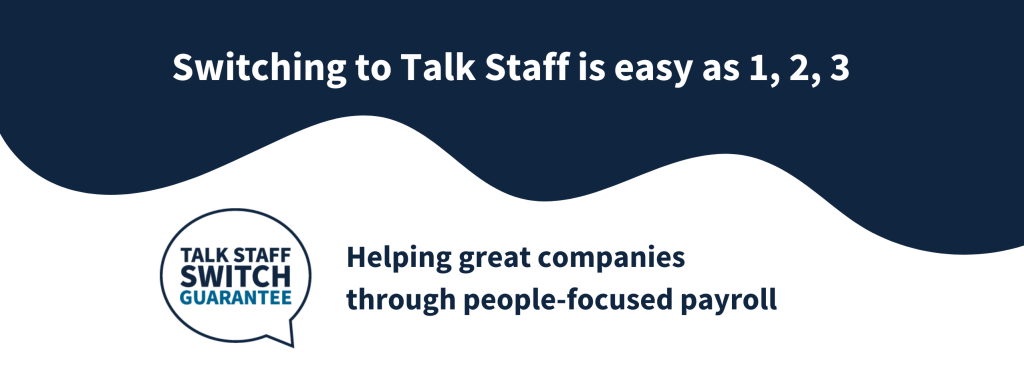
UK Holiday Entitlement Changes
UK holiday entitlement is changing as the government brings in payroll changes for 2024. This is designed to simplify the payroll process for employers as well as irregular hours and part-year workers through a series of new regulations.
Here are the top reasons why this is happening:
- To close some gaps experienced by workers: For employee benefits and holiday entitlement
- To create better transparency in the payroll system
- To prevent payroll inaccuracies which lead to over or underpayments
- To remove confusion from the current payroll process
These new payroll regulations came into force on 1st January 2024, changing holiday laws for part-year and irregular hours workers, with further payroll changes from 1st April 2024 for effected employees.
Companies need to work closely with their UK Payroll services Provider or their in-house payroll team to stay compliant and ensure workers are paid accurately and on-time.
Explore how Talk Staff Can Help – UK Payroll Services
UK Holiday Entitlement Changes Summarised
Here’s a list of the main UK holiday entitlement changes for irregular hours and part-year workers:
Payroll is seeing a new holiday calculation method introduced, designed to calculate any statutory holiday entitlement for irregular hours and part-year workers.
The definition of irregular hours and part-year workers will change relating to this introduction of the holiday entitlement accrual method as well as rolled-up holiday pay.
‘Normal remuneration’ has been redefined in relation to statutory leave.
Rolled-Up Holiday Pay will be an alternative way to calculate holiday pay for part-year and irregular hours workers.
There is also a new method to work out holiday entitlement from maternity leave and family-related leave as well as sick leave.
The current rates of holiday pay will be maintained where 4 weeks is paid at normal rate of pay and 1.6 weeks is paid at the basic rate of pay (all whilst retaining the two distinct pots of leave. The 4 weeks is based on EU law with an extra 1.6 based on UK Law.
These changes will nullify the Working Time (Coronavirus) (Amendment) Regulations which were brought in in 2020 so workers will need to claim this by 31st March.
View more payroll changes


How does these reforms effect regular workers?
There will be no change to how holiday is accrued for full time workers or anyone else who doesn’t fall under the irregular hours and part-year workers definition. They will continue to accrue at 1/12th of the 5.6 weeks holiday entitlement they are owed for each full or part month.
In the first year of their employment workers will receive one 12th of their statutory UK holiday entitlement on the first day of the month. After the first year of their employment UK holiday entitlement is based on contractual and statutory entitlement, which is based on the proportion of a week they are contracted to work, otherwise known as ‘pro-rating.’
From after 1st April 2024 – How do things change for UK holiday entitlement ?
You need to calculate holiday entitlement for irregular hours and part-year workers based on where their leave years fall, before or after 1st April 2024.
- For leave years beginning prior to 1st April 2024 – Workers will see their UK holiday entitlement calculated the same way as usual. This Government Holiday Entitlement Calculator explains more.
- For leave years beginning after 1st April 2024 – After this date (or on the date itself) the new accrual method will be used for both the 1st year of employment and after that. This will be calculated at 12.07% of actual hours worked within a pay period.
How we helped a Derby business – Payroll Case Study
The Options: New Accrual Method and the Rolled-up Holiday Pay
These are the options for the holiday years that start from 1st April 2024 for irregular hours and part-year workers.
Option 1: Accrual System
Eligible employees will accrue holiday entitlement for their annual leave on the last day of their regular pay period, accruing at a rate of 12.07% based on hours worked. There is a maximum number of days which can be accrued per year which are 28 days.
This method is designed so that your workers can build up UK holiday entitlement as they work rather than receiving their whole years’ holiday entitlement up front.
Option 2: Rolled-Up Holiday Pay (RHP)
This method means the employee’s holiday pay is paid at the same time as basic pay. From 1st April 2024 employees will be eligible for this method as long as:
They fall under the correct definition of worker
Holiday pay is still calculated at 12.07% of all pay for work done
Holiday pay is paid at the same time as pay for work done in their payslips
This is clearly itemised on the payslip as part of the payroll process
This option exists for situations when holiday entitlement and pay for workers is more complex such as hours being very irregular or occasional. Essentially you can pay your employees an extra 12.07% pay supplement meaning any holiday taken is counted as unpaid.
However, it’s crucial that employers and employees recognise that this new system doesn’t mean workers can work 52 weeks a year without taking their holiday entitlement.
The employer will be required to play eligible workers with each pay day, rather than when the leave is taken (as has previously been required) under European case law, and employers must clearly mark RHP payments as separate items on each payslip.
Learn more about calculating holiday entitlement
Annual Leave Notes to Consider
If employers introduce changes to their terms and conditions they must also seek to reach an agreement with either their workers directly or their representatives.
As an employer you need to work closely with your outsourced HR provider or in-house HR team to stay compliant. You should do this by ensuring workers still take at least their minimum holiday entitlement, the only difference is when they take this holiday it will be unpaid.
Read more about our Payroll Switch Guarantee


Carrying Forward Leave as part of The Retained EU Employment Bill
As part of the annual leave entitlement rules, existing regulations for carrying forward leave will remain for maternity, SSP and additional family-related leave. There are also some additions to the rules:
- 52-week period – The ‘statutory’ leave for part-year and irregular workers will be calculated on their hours worked in a previous 52-week period, this includes zero paid weeks.
- The right to carry over annual leave – This will come into force when the employer fails to inform the worker of their right to paid annual leave, or not giving adequate conditions for them to take this leave.
How to check if an employee counts as irregular hours or a part-year worker
The new UK holiday entitlement regulations set out a definition to make it easier for employers to check whom these working reforms apply to:
- Irregular Hours Worker – This means they work “wholly or mostly variable” paid hours, under the terms of their contract, for each pay period and this contract can be a casual or zero-hours contract. If their hours are fixed they will not qualify. The number of hours they work each week must be different.
- Part-Year Worker – They must only work part of a year with periods of at least a week during that year when they aren’t required to work. In contrast to irregular hours workers, part-year workers may have fixed hours. An example of part-year workers happens a lot in the education sector.
TUPE changes
In addition, from the start of 2024 it has no longer been a requirement for employees to consult with affected employees via representatives when it comes to a TUPE transfer (Transfer of undertakings protection of employment) when the business employees less than 50 employees, or for transfer on or after 1st July 2024 when the business employees less than 10 employees (regardless of the size of the employer).
Annual Leave Carry Over For Workers
Here are a few new rules about carrying over annual leave:
- Covid-related leave – These rules will place a deadline of 31st March 2024 for carrying over covid-related leave accrued before 1st January 2023.
- Maternity and family related leave – Holidays that workers are entitled to, that they weren’t able to take due to family-related leave or maternity leave, can be carried over and used in the next year.
- Reasonable opportunity – If the employer hasn’t given ‘reasonable opportunity’ for eligible workers to take this leave or weren’t properly informed that they could loose these days then these days can be carried over into the next year. This also stands if workers weren’t paid holiday pay which they were entitled to.
- Sick leave – Up to 28 days leave can potentially be carried over for irregular hours or part-year workers due to sick leave too. Read more about sick leave here.
Our people consultancy also offer Outsourced HR services
Normal Remuneration
“Normal remuneration means fixed monthly remuneration paid to the employee whether the amount paid is fixed or variable as specified in the contract of service in writing or otherwise.”
Under the new rules 4 weeks of the minimum 5.6 weeks’ paid holiday entitlement must be paid at the worker’s normal rate of pay whereas anything additional can be paid at a basic rate of pay.
There is extra guidance into what the normal rate of pay must include for example the performance of tasks that a worker was contractually obliged to carry out.
Payments for overtime (plus commission and other payments) “which have been regularly paid to a worker in the 52 weeks preceding the calculation date” needs to be taken into account and included for the normal rate of pay.


UK Holiday Entitlement Payroll Support
When any payroll change is brought in, this can cause an increase in admin along with the extra pressure to stay compliant. All of this can add extra strain to your payroll process and confusion for yourself and your team.
Working with a trusted payroll services uk provider means you have the confidence that things will go smoothly, let them take control of the changes and help alleviate the added pressure on your team.
Talk Staff’s Outsourced Payroll Services UK Team are known for their focus on relationships with a responsive knowledgeable team that can get you up and running within 14 days* with our payroll switch guarantee.
What’s more we can also offer HR support and advice when you need it.
Contact us for a payroll quote today.
Please note that the information in this blog was created based on the integrity of reputable links at the time of publishing. These blogs should be used for guidance only, you should always check information further before taking action as sources may update over time. Talk Staff holds no responsibility for implementation or loss.





